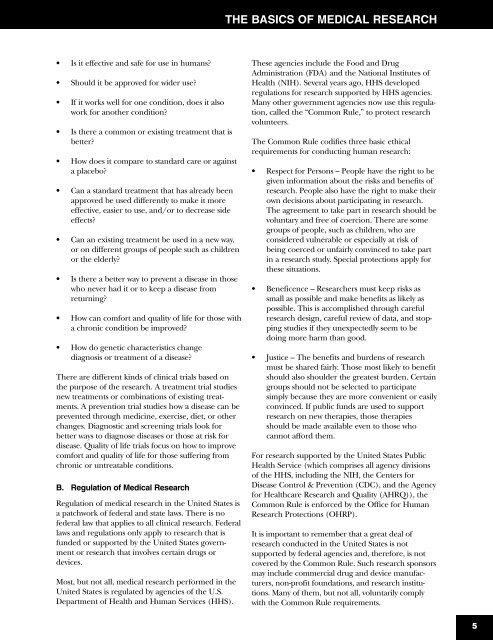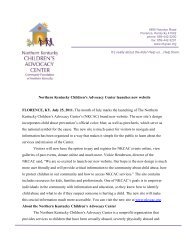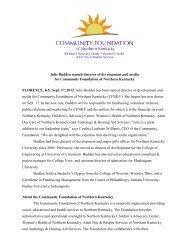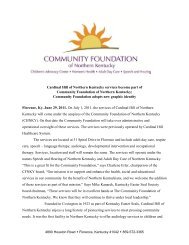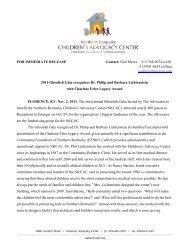Medical Research: A Consumer's Guide for Participation
Medical Research: A Consumer's Guide for Participation
Medical Research: A Consumer's Guide for Participation
You also want an ePaper? Increase the reach of your titles
YUMPU automatically turns print PDFs into web optimized ePapers that Google loves.
THE BASICS OF MEDICAL RESEARCH<br />
• Is it effective and safe <strong>for</strong> use in humans?<br />
• Should it be approved <strong>for</strong> wider use?<br />
• If it works well <strong>for</strong> one condition, does it also<br />
work <strong>for</strong> another condition?<br />
• Is there a common or existing treatment that is<br />
better?<br />
• How does it compare to standard care or against<br />
a placebo?<br />
• Can a standard treatment that has already been<br />
approved be used differently to make it more<br />
effective, easier to use, and/or to decrease side<br />
effects?<br />
• Can an existing treatment be used in a new way,<br />
or on different groups of people such as children<br />
or the elderly?<br />
• Is there a better way to prevent a disease in those<br />
who never had it or to keep a disease from<br />
returning?<br />
• How can com<strong>for</strong>t and quality of life <strong>for</strong> those with<br />
a chronic condition be improved?<br />
• How do genetic characteristics change<br />
diagnosis or treatment of a disease?<br />
There are different kinds of clinical trials based on<br />
the purpose of the research. A treatment trial studies<br />
new treatments or combinations of existing treatments.<br />
A prevention trial studies how a disease can be<br />
prevented through medicine, exercise, diet, or other<br />
changes. Diagnostic and screening trials look <strong>for</strong><br />
better ways to diagnose diseases or those at risk <strong>for</strong><br />
disease. Quality of life trials focus on how to improve<br />
com<strong>for</strong>t and quality of life <strong>for</strong> those suffering from<br />
chronic or untreatable conditions.<br />
B. Regulation of <strong>Medical</strong> <strong>Research</strong><br />
Regulation of medical research in the United States is<br />
a patchwork of federal and state laws. There is no<br />
federal law that applies to all clinical research. Federal<br />
laws and regulations only apply to research that is<br />
funded or supported by the United States government<br />
or research that involves certain drugs or<br />
devices.<br />
Most, but not all, medical research per<strong>for</strong>med in the<br />
United States is regulated by agencies of the U.S.<br />
Department of Health and Human Services (HHS).<br />
These agencies include the Food and Drug<br />
Administration (FDA) and the National Institutes of<br />
Health (NIH). Several years ago, HHS developed<br />
regulations <strong>for</strong> research supported by HHS agencies.<br />
Many other government agencies now use this regulation,<br />
called the “Common Rule,” to protect research<br />
volunteers.<br />
The Common Rule codifies three basic ethical<br />
requirements <strong>for</strong> conducting human research:<br />
• Respect <strong>for</strong> Persons – People have the right to be<br />
given in<strong>for</strong>mation about the risks and benefits of<br />
research. People also have the right to make their<br />
own decisions about participating in research.<br />
The agreement to take part in research should be<br />
voluntary and free of coercion. There are some<br />
groups of people, such as children, who are<br />
considered vulnerable or especially at risk of<br />
being coerced or unfairly convinced to take part<br />
in a research study. Special protections apply <strong>for</strong><br />
these situations.<br />
• Beneficence – <strong>Research</strong>ers must keep risks as<br />
small as possible and make benefits as likely as<br />
possible. This is accomplished through careful<br />
research design, careful review of data, and stopping<br />
studies if they unexpectedly seem to be<br />
doing more harm than good.<br />
• Justice – The benefits and burdens of research<br />
must be shared fairly. Those most likely to benefit<br />
should also shoulder the greatest burden. Certain<br />
groups should not be selected to participate<br />
simply because they are more convenient or easily<br />
convinced. If public funds are used to support<br />
research on new therapies, those therapies<br />
should be made available even to those who<br />
cannot af<strong>for</strong>d them.<br />
For research supported by the United States Public<br />
Health Service (which comprises all agency divisions<br />
of the HHS, including the NIH, the Centers <strong>for</strong><br />
Disease Control & Prevention (CDC), and the Agency<br />
<strong>for</strong> Healthcare <strong>Research</strong> and Quality (AHRQ)), the<br />
Common Rule is en<strong>for</strong>ced by the Office <strong>for</strong> Human<br />
<strong>Research</strong> Protections (OHRP).<br />
It is important to remember that a great deal of<br />
research conducted in the United States is not<br />
supported by federal agencies and, there<strong>for</strong>e, is not<br />
covered by the Common Rule. Such research sponsors<br />
may include commercial drug and device manufacturers,<br />
non-profit foundations, and research institutions.<br />
Many of them, but not all, voluntarily comply<br />
with the Common Rule requirements.<br />
5


